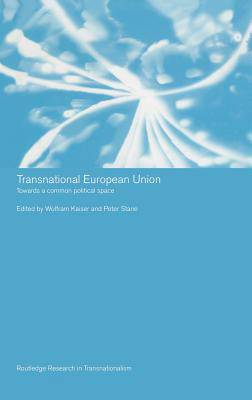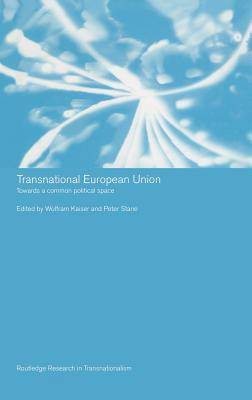
Je cadeautjes zeker op tijd in huis hebben voor de feestdagen? Kom langs in onze winkels en vind het perfecte geschenk!
- Afhalen na 1 uur in een winkel met voorraad
- Gratis thuislevering in België vanaf € 30
- Ruim aanbod met 7 miljoen producten
Je cadeautjes zeker op tijd in huis hebben voor de feestdagen? Kom langs in onze winkels en vind het perfecte geschenk!
- Afhalen na 1 uur in een winkel met voorraad
- Gratis thuislevering in België vanaf € 30
- Ruim aanbod met 7 miljoen producten
Zoeken
Transnational European Union
Towards a Common Political Space
€ 351,45
+ 702 punten
Omschrijving
At the beginning of the twenty-first century, the European Union is an increasingly dense transnational social and political space. More and more non-governmental organisations develop transnational links, which are usually more intensive within the EU, even if they often extend beyond its borders to the wider world.
This multi-disciplinary volume explores the importance of these structures, actors and relations for EU and European governance in the context of the theoretical debate about European integration in the social sciences. This book delivers:- theoretical chapters examining and discussing the main conceptual perspectives to studying the transnational EU to provide a current overview
- empirical case studies of transnationalism in practice on transnational party, trade union and police cooperation to transnational education policy-making and transnational consensus-building in EMU governance.
This volume will be of great interest to students in social sciences, contemporary history and law.
Specificaties
Betrokkenen
- Uitgeverij:
Inhoud
- Aantal bladzijden:
- 244
- Taal:
- Engels
- Reeks:
Eigenschappen
- Productcode (EAN):
- 9780415365123
- Verschijningsdatum:
- 28/07/2005
- Uitvoering:
- Hardcover
- Formaat:
- Genaaid
- Afmetingen:
- 160 mm x 242 mm
- Gewicht:
- 548 g

Alleen bij Standaard Boekhandel
+ 702 punten op je klantenkaart van Standaard Boekhandel
Beoordelingen
We publiceren alleen reviews die voldoen aan de voorwaarden voor reviews. Bekijk onze voorwaarden voor reviews.








